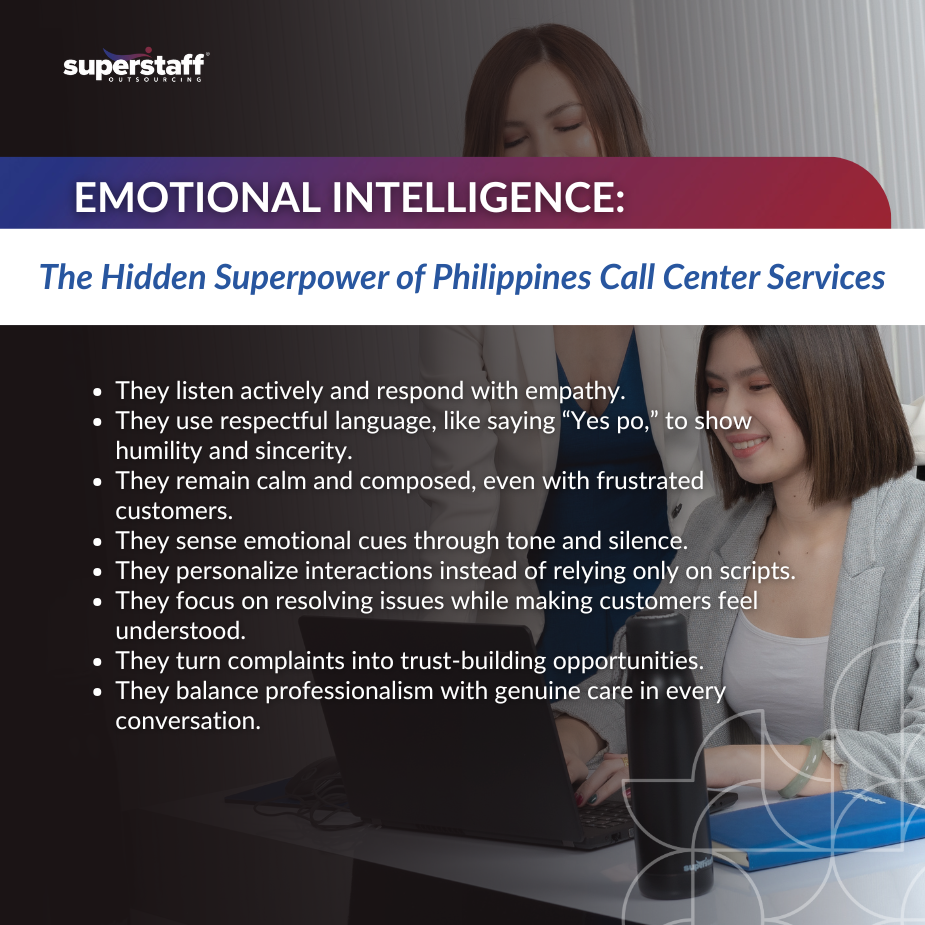
Emotional intelligence is the quiet power behind the Philippines’ world-class call center industry. While technical proficiency ensures smooth transactions, it’s emotional connection that transforms customers into loyal advocates. In the world of customer experience, success is no longer measured only by resolution speed—it’s also about how customers feel after every interaction.
From managing irate customers to delivering empathy across borders, Filipino agents have built a reputation for blending warmth with professionalism. They understand that behind every query is a human being who wants to be heard, not just helped.
This article explores how emotional intelligence shapes the mindset of Filipino agents and why it gives the Philippines call center services industry a distinctive edge in the global outsourcing market. It highlights the people-first psychology, cultural foundations, and structured training systems that transform emotional intelligence into measurable business outcomes.
Emotional Intelligence as the Heart of Filipino Customer Service
Filipino agents don’t just handle calls—they connect through emotion, tone, and empathy. The secret to their success lies in their ability to sense the customer’s emotional state and respond accordingly. In an industry often defined by scripts, Filipino agents add a human touch that feels authentic.
Empathy, patience, and adaptability are not optional traits in Philippines call center services; they’re the foundation. These soft skills enable agents to de-escalate difficult conversations, turn frustrations into satisfaction, and make every interaction feel personal.
- The “Yes po” culture reflects respect and humility, showing a sincere willingness to help.
- Empathy-driven communication transforms complaints into loyalty-building opportunities.
- Relationship-building is instinctive; Filipino agents often treat customers like extended family.
This level of emotional intelligence cannot be automated or mimicked by software. It’s a deeply ingrained skill nurtured through cultural values and social upbringing. Filipino agents don’t just follow procedures—they intuitively understand tone, timing, and trust.
This emotional intelligence isn’t accidental; it’s shaped by the country’s unique cultural and social foundations.

Cultural Roots That Strengthen Emotional Intelligence
The Filipino mindset is molded by values that naturally enhance emotional intelligence. At the heart of every Philippines call center service operation lies a workforce shaped by empathy, patience, and resilience—traits embedded in Filipino culture long before the BPO boom.
The Philippines’ collectivist society prioritizes community, harmony, and belonging. These principles translate effortlessly into customer service. When agents interact with foreign clients, they project the same care and respect they extend to family members.
- “Pakikisama” (getting along) encourages harmony and understanding, even in challenging situations.
- “Utang na loob” (sense of gratitude) fosters accountability and sincerity in service.
- Strong community ties and religious grounding reinforce compassion and moral responsibility.
- Bilingualism and cultural adaptability help agents empathize with customers across borders.
This human-first philosophy explains why the Philippines call center services sector consistently outperforms competitors. Filipino agents don’t just communicate—they relate. They bring emotional steadiness, patience, and optimism even when customers are upset.
The cultural ability to empathize, stay calm, and maintain composure turns what could be a stressful job into a mission-driven service. When empathy is part of one’s cultural DNA, it becomes a business superpower.
These deep-rooted values are amplified by how the BPO industry structures its training and leadership.
Training Programs That Build Emotionally Intelligent Agents
BPO companies in the Philippines understand that emotional intelligence is both innate and trainable. That’s why call center soft skills training is just as important as technical training. From onboarding to leadership programs, emotional intelligence is systematically developed to help agents manage high-pressure interactions gracefully.
Top Philippines call center services invest heavily in equipping employees with essential call center agent skills such as active listening, problem-solving, and emotion regulation. Training programs go beyond role-play; they simulate real-world challenges that test both empathy and composure.
- Role-playing and empathy mapping help agents anticipate and respond to diverse emotional cues.
- Coaching frameworks emphasize managing tone, energy, and word choice during difficult calls.
- Mentorship programs teach emotional resilience, focusing on understanding the customer’s perspective as a KPI.
Training isn’t limited to entry-level employees. Supervisors and team leads receive continuous coaching to reinforce emotionally intelligent leadership. Managers are encouraged to listen actively to agents’ challenges, fostering a culture of empathy that mirrors the service they deliver to clients.
This approach ensures that emotional intelligence isn’t just an individual trait—it’s an organizational competency. Every process, from quality assurance to performance metrics, integrates empathy as a standard for success.
When trained emotional intelligence meets genuine cultural warmth, the business results speak for themselves.
Business Outcomes of Emotionally Intelligent Call Center Teams
Emotional intelligence directly impacts performance metrics, customer retention, and overall satisfaction. It’s more than just a soft skill—it’s a measurable driver of success.
For Philippines call center services, emotional intelligence has proven to be a strategic differentiator in a crowded global outsourcing landscape.
- Higher first-call resolution (FCR) rates: Agents who understand customers emotionally can identify root causes faster.
- Improved customer satisfaction (CSAT) and Net Promoter Scores (NPS): Empathy and tone elevate the customer’s experience, even when the problem isn’t fully resolved.
- Lower agent turnover: Emotional intelligence fosters a sense of purpose and fulfillment, reducing burnout.
- Stronger brand trust: Customers feel genuinely valued, not processed through a script.
Clients who outsource to the Philippines often cite emotional intelligence as a key reason for success. Filipino agents are trained to read subtle cues—hesitation, frustration, silence—and tailor responses accordingly. This adaptability creates personalized experiences that turn ordinary transactions into memorable moments.
In essence, emotional intelligence acts as a multiplier. It amplifies communication skills, enhances efficiency, and fuels long-term loyalty. Companies that integrate emotionally intelligent customer service see quantifiable gains in both customer lifetime value and brand advocacy.
These outcomes show that emotional intelligence isn’t just a soft skill—it’s a business strategy.
The Future of Emotional Intelligence in the Age of AI
As automation continues to advance, emotional intelligence becomes the human differentiator technology cannot replicate. While AI tools can manage chat queues and analyze sentiment, they cannot replace the empathy that defines Philippines call center services.
Filipino agents have evolved alongside technology. They’re no longer just call handlers—they’re hybrid communicators who know how to balance automation with authenticity. In AI-driven environments, their emotional intelligence ensures that technology enhances, not replaces, the human touch.
- Human-AI collaboration keeps emotional connection alive by allowing agents to focus on empathy while AI handles routine tasks.
- AI-enhanced training programs now use simulations to teach emotion recognition, helping agents sharpen real-time responses.
- Emotional intelligence ensures that automation remains customer-centric, not mechanical.
In an era where customer interactions often begin with chatbots, it’s the human touch that seals loyalty. Emotional intelligence transforms digital experiences into meaningful exchanges.
This shift proves why emotional intelligence as a business advantage in customer support is more relevant than ever. As AI handles scale, Filipino agents handle sentiment. Together, they form the perfect blend of efficiency and empathy—two forces driving the next evolution of customer experience.
In a world of automation, the Filipino call center model proves that heart still leads the way.
Partner With SuperStaff for World-Class Philippines Call Center Services
Emotional intelligence defines not only how Filipino agents serve but how the Philippines competes globally. The success of Philippines call center services rests on the simple yet powerful principle that empathy drives excellence.
It’s a blend of culture, training, and leadership that turns emotional awareness into a measurable advantage. Filipino agents connect through respect, adapt through empathy, and deliver consistency through understanding. These values resonate across every channel—voice, chat, or social media—making the Philippines the global benchmark for emotionally intelligent customer service.
For businesses seeking a team that truly understands and connects with people, the choice is clear. Look to SuperStaff—where emotional intelligence is part of every conversation, and where every “Yes po” carries the promise of genuine care and world-class service.
Connect with us, and learn more about our comprehensive call center outsourcing solutions.






